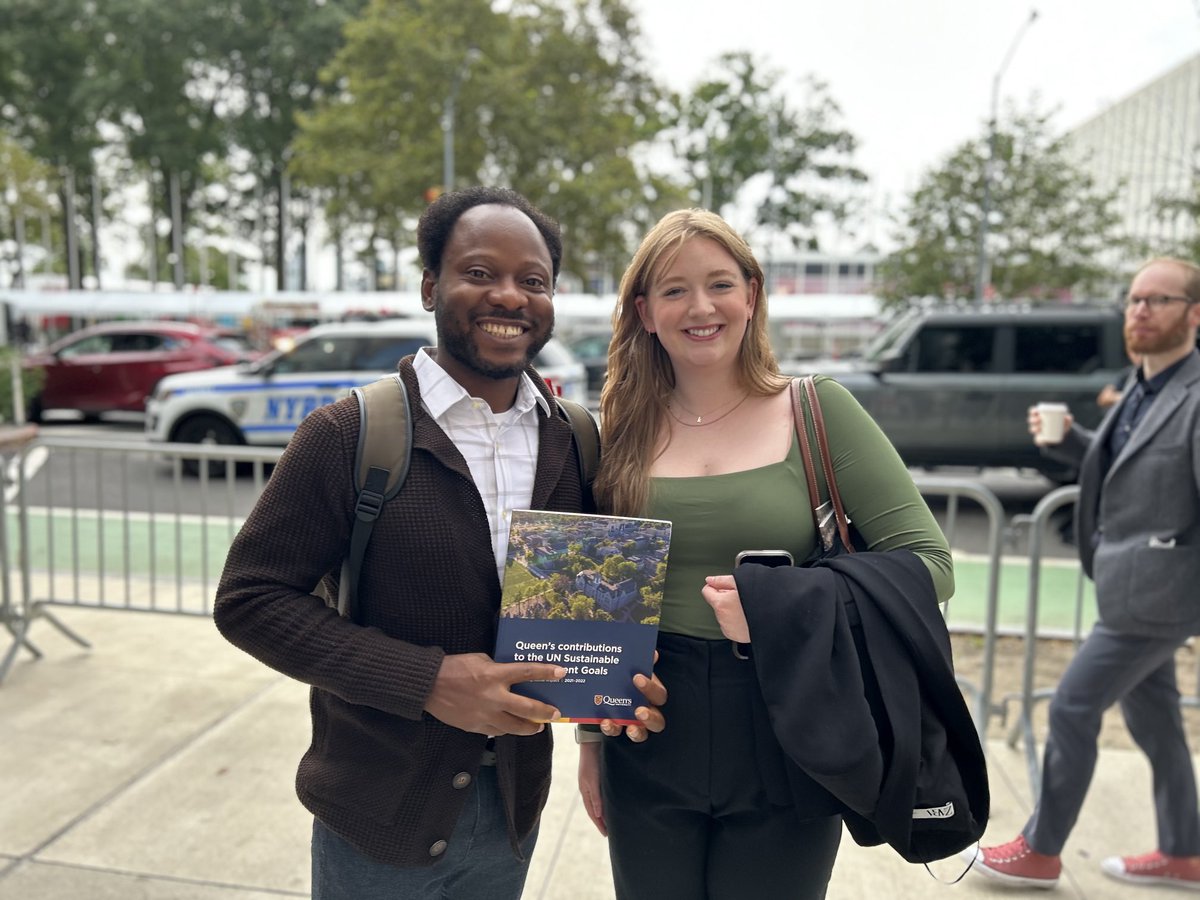In late September, global leaders gathered in New York City for the United Nations’ General Assembly’s Sustainable Development Goal (SDG) Summit. The question on everyone’s mind: at the midway point in an ambitious 15-year pledge to meet a series of SDG targets by 2030, how much progress has been made? The answer, some, but not enough. The summit called for a renewed commitment and energy from participating countries.
Ahead of the summit, the UN held an SDG Action Weekend, a two-day event which aimed to set out specific commitments and contributions to drive SDG transformation between now and 2030. The event brought together various stakeholders groups including, UN entities, member states and members of civil society, the private sector, youth, scientists, local and regional governments, and others equipped to mobilize action for the SDGs now and into the future.
The United Nations’ Educational, Scientific, and Cultural Organization (UNESCO) invited us, as members of the Queen’s community, to join their SDG Action Weekend delegation because of the university’s standout performance in the Times Higher Education Impact Rankings and our commitment to global impact. Through previous engagements with Queen’s, UNESCO colleagues knew that Queen’s had important insights to share and we were provided the opportunity to discuss our experience in a panel on SDG 17: Partnerships for the Goals.
Overall, the experience was inspiring. It was fascinating to hear leaders, scholars, activists, and professionals from different sectors and parts of the world speak passionately about their work, contributions, and commitment to the SDGs.

Below, are our five key takeaways from the weekend and the summit:
The need for accelerated action and innovation. The summit underscored the urgent need for accelerated actions and innovative solutions to meet the SDGs, given that we are not meeting desired progress toward the goals. In fact, if we continue with current levels of progress, only 15 per cent of targets will be met by 2030. Delegates placed emphasis on scaling up initiatives in key areas such as education, data, financial system reformation, energy, climate action, and sustainable food systems, with partnership identified as an integral component.
The critical importance of youth. Youth must be meaningfully involved in our efforts to meet SDG targets. Youth participation, contributions, and catalytic mobilization were essential to the success of the SDG Summit and its follow-up. Youth at the Action Weekend characterized themselves as the torchbearers of the SDGs and played a major role in the organization, leadership of sessions, contributions on panels, and leadership for the weekend. The fresh ideas, different ways of thinking, and new approaches that come with a younger generation will be critical to push us all to think and act differently in order to meet our targets by 2030.
The need for localization of efforts to meet SDGs. The role of local governments and municipalities in localizing and accelerating the SDGs was emphasized throughout the weekend. It was great to see mayors from different parts of the world, including the Mayor of Kitchener, Ont., speak about how their cities are localizing/integrating SDGs into strategic planning and municipal service delivery and, as such, play a key role in SDG acceleration. One interesting example came from the Mayor of Bogota, Colombia who highlighted her groundbreaking initiative Care Blocks to support caregivers across the city as a means to drive gender equality, educational advancement, and the economy.
Reaffirmed commitment to equity and inclusivity. There were strong calls for increased efforts on equity and inclusion as critical components of SDGs. Leaders acknowledged the need for policies, solutions, and innovations to be inclusive in order to achieve SDGs and address the needs of vulnerable and marginalized groups. Leaders emphasized and reaffirmed their commitment to the UN “Leave No One Behind” principle, which is the central, transformative promise of the 2030 Agenda for Sustainable Development and strongly tied to inclusivity. In addition, there was a unified voice emphasizing the need for meaningful participation of marginalized groups in decision-making. The message was loud and clear, SDGs cannot be achieved without a commitment to equity and inclusivity.
We all have a role to play. The United Nations’ General Assembly was the place for governments to recommit and be accountable to their promises toward the goals, through mobilization of resources and concrete actions. Civil society, the private sector, scientists, and other stakeholders must hold governments accountable for their commitments, and offer solutions to realize the SDGs. Our voices are even more powerful when we come together in partnership to achieve the SDGs. Many of the leaders, including heads of state, participating in the UNGA also participated in the Action Weekend sessions. It was an important opportunity to engage in critical debates on delayed progress and offer concrete solutions to solve some of the world’s greatest challenges.
For more information on Queen’s contributions to the SDGs, please visit the university’s Social Impact website.
Originally published in the Queen's Gazette.